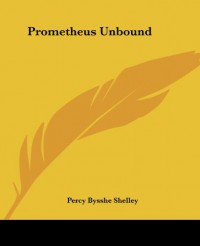The War between Faith and Reason

This is probably what you would consider to be Shelley's Magnus Opus. This would be his most ambitious work and also what he is probably most famous for (though at least one lecturer has suggested that as a poet Shelley is somewhat dwarfed by his wife Mary Shelley, who is also the author of Frankenstein). This is sort of a sequel to the Aeschylan play Prometheus Bound and I say sort of a sequel because we have fragments of the original sequel, but the play itself is lost.
Prometheus Unbound is what you call a lyrical drama, which is in a similar vein to Milton's Samson Agonistes. The idea of a lyrical drama is that it is not written to be performed but rather to be read (and as I have indicated reading a drama without watching it being performed can be a difficult task), the performance, as some have suggested, goes on in the imagination.
The scope of this work is immense and Shelley explores some of the themes that have come out of the original play, and then brings them through to his own conclusion. While Shelley was an atheist, he uses the mythological as a method of criticising his own society, and the conflict that had arose between faith and science. Shelley's Jupiter is representative of God, which, to Shelley, is representative of the church who seeks to hold society in chains and prevent them from being able to examine and question the world in which he lives. His Prometheus is representative of the rational human, the one who questions and explores, but is attacked by the church because of that desire. Demogorgon could be seen as social change, which frees the rational mind from those chains, and pushes blind faith into the background.
The idea behind the original play is that humanity had fallen from grace and was living in a world of suffering, so Prometheus, against the decree of Zeus, teaches them the art of making fire and for doing so he is punished by being chained to a rock and having his liver ripped out on a daily basis by a vulture. The play ends with Prometheus being cast down into the netherworld. The idea that I see in this play is the concept of humanity being given the gift of technology (which is representative of fire) and by having this ability it strengthens them against the power of the deity. In Shelley's mind this is the idea of science, and we see in the past when people began to explore the nature of the world the church would respond in an aggressive manner, for fear that in doing so God would be unseated from his throne. This war continues to this day, with fundamentalist preachers (and I am only speaking of Christianity here) claiming that science unseated God from his throne, and evolution unseated humanity from the pinnacle of creation. In the end though, no matter how much faith we have, the Earth is not the centre of the universe.
Notice though that the original play ends with Prometheus being cast into hell, and that the second play, where Zeus and Promentheus are reconciled, no longer exists. It may be just coincidence, but the play ends with the triumph of faith over reason, and the play in which faith and reason come together in mutual agreement no longer exists. In a way this is very Hegalian in that we have opposites, with the thesis being faith and the anti-thesis being reason (or is it the other way around?), but the reconciling (or the synthesis) of faith and reason never comes about. Even today many a church baulks at the concept of a synthesis between faith and reason, and forces reason, and with it humanism, out of the door. My position is that since God gave us the gift of reason, the ability to be able to think and question, then to deny that gift, and to deny everything that comes from that gift, is to do a disservice to God. However that does not mean that we do not question what comes out of humanism, for to blindly accept what is said without questioning is to once again do a disservice to God.
As for Prometheus Unbound, there is no synthesis of faith and reason. In fact faith comes out as the loser in the struggle, with reason being freed by Demogorgon (and being an atheist we cannot consider that Shelley would necessarily believe in Satan), with represents the complete destruction of faith. In the end reason triumphs, and faith, and the church, are left being in the dark annals of history. Notice though, that it is Demogorgon and not Satan. Shelley is purposeful in this in that he indicates that the character of Satan, as painted by Milton, is a rather poor character in his opinion. Granted, Shelley could have created his own Satan, however he seems to feel bound to Milton's interpretation, and a creature that is fuelled and dominated by revenge would not serve the purposes of his poem. Shelley did not want a character with a chip on his shoulder, but rather a character that frees reason from his chains to allow him to prosper and flourish.
I have also written a blog post on the original play, however I do touch on this poem as well.
 2
2


